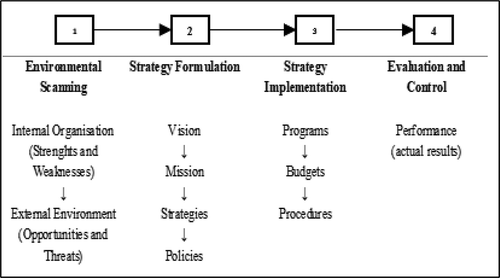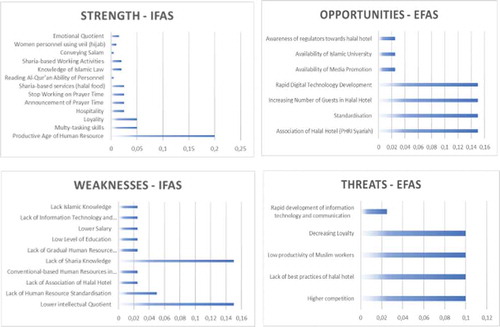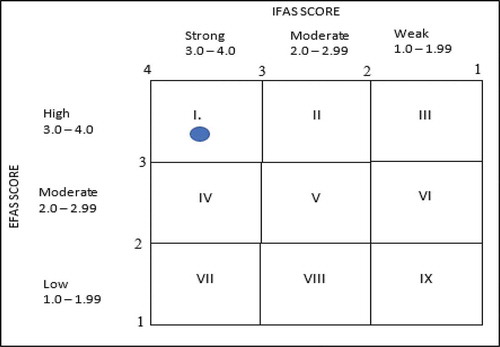Abstract
The emergence of halal hotel businesses has attracted many scholars’ and practitioners’ attention. However, the halal hotel concept and the required human resources are still not very clear. This study aims to examine the internal and external aspects of halal hotel human resources in Indonesia and propose a proper human resource strategy by using the strategic management standpoint. This study employed a qualitative approach via recorded personal interviews with seven halal hotel managers in Bandung, Indonesia. The data were transcribed and analysed by using content analysis. The finding concludes that the halal hotel business position is in the first quadrant of the internal and external strategy matrix, meaning that the halal hotel is needed to develop a growth or concentration strategy. Consequently, in terms of human resources strategy, the halal hotels need to implement multichannel procurement through regular programs, talent scouting, and campus hiring, conduct staff re-assessment, and increase the brand reputation of the halal hotel. The paper contributes to the emerging research on halal hotel human resources strategy.
PUBLIC INTEREST STATEMENT
The concept of the halal hotel has emerged recently in research. It becomes an essential factor, particularly in a tourist destination following the requirement of Islamic law known as Shariah. However, this concept is still not well known; thus, it needs to be developed in specific areas including in the strategic management field. This research proposes a strategy formulation for the halal hotel’s human resources. To design the strategy, this research at first evaluates strengths, weaknesses, opportunities, and threats of the halal hotel’s human resources. It then determines the business position of the hotel. And finally, it proposes human resources’ business strategy. The identified strategy is growth or concentration, meaning that the hotel should strengthen its human resources’ position within the existing competition. A more robust human resources position can be achieved through several strategies: the procurement, development, and maintenance strategies. Thus, the hotel can attract the best talent in the hospitality business.
1. Introduction
The increasing demand for halal hotel human resources is derived from the emerging halal economy and tourism in Muslim majority countries (Karia & Fauzi, Citation2019). The halal hotel itself is a type of hotel following Islamic law or Sharia (Ahmat et al., Citation2015). Islamic law is a religious law derived from the religious precepts of Islam, particularly the Quran and the hadith or prophetic traditions of Muhammad (Esposito, Citation2014). The application of Sharia in modern times has been a subject of different interpretations among Muslim jurists, mainly reflected in other legal schools (madhahib), which are the Hanafi, Maliki, Shafii, and Hanbali. The halal hotel has been constructed uniquely compared to its conventional hotels as shown in Table .
Table 1. Comparison of conventional and halal hotel attributes
Previous studies on halal hotel human resources mostly focused on the normative point of view. Those studies discussed that halal hotels needed specific requirements for its human resources, such as woman staff should use veil (hijab), and all staff should be able to recite the Holy Qur’an (Neveu, Citation2010). Some researchers suggested separating male and female room services for guests (Karia & Fauzi, Citation2019). Other studies focused on halal certification (Rosenberg & Choufany, Citation2009; Razalli et al., Citation2013; Salleh et al., Citation2014; Battour & Ismail, Citation2016). Halal certification is compulsory obtained religious legitimation from Muslim authorities in some countries such as Indonesia and Malaysia.
Based on a preliminary interview with halal hotel staff in Bandung in 2018, this study found that halal hotel was still in the struggling of how to empower its human resources, especially in technical and managerial aspects of hospitality businesses. Most of the human resources were still lack of understanding about customer services in hospitality areas, despite their excellent knowledge in Islamic law.
Based on the above phenomenon, this research aims to examine the strengths, weaknesses, opportunities, and threats of the halal hotel, mainly regarding their human resources. Then, the study will propose a proper business strategy for halal hotel human resources. This research employs the strategic management approach to achieve research objectives.
2. Halal hotels in Indonesia
In Indonesia, the pioneer of the halal hotel was Sofyan hotel. In 1992, this hotel introduced “halal hospitality-concept,” meaning that the hotel serving its guest following Islamic law. The founder of Sofyan hotel was originally from Minang tribe, an ethnic in Indonesia that practicing orthodox Muslim tradition (Sofyan Hotel, Citation2019). The halal hotel concept introduced by Sofyan hotel is shown in Table .
Table 2. Sharia requirements of Sofyan hotel
According to the Indonesian Ulama Council (MUI), there are only four hotels that have been certified as halal hotels. However, some local hotels are claiming to be halal or Sharia-compliant. The emergence of these hotels has been derived from the rise of Islamic tourism in Indonesia. Some Muslims in the country voice the need to vacate in environments that respect their beliefs. Their concerns include accommodation with prayer rooms and gender segregation at swimming pools and beaches. The voice has attracted hotel owners to develop hotels following the preferences of those Muslim customers.
3. Regulation of halal hotels in Indonesia
In Indonesia, the halal hotel is governed by two regulatory entities: state agency and non-state agency. The state agency is represented by the Ministry of Tourism and Creative Economy, which manages halal tourism, including the halal hotel. Meanwhile, the non-state agency is represented by the Indonesia Ulama Council (MUI), which advises the Ministry concerning Sharia aspects of halal hotel activities. The Indonesia halal hotel businesses are regulated by the Minister of Tourism and Creative Economy decision number 2, 2014, concerning the implementation of the halal hotel (Ministry of Tourism and Creative Economy, Citation2014). The minister’s decision classified halal hotel into two types: Hotel Sharia Hilal-1, and Hotel Sharia Hilal-2. The following Table compares and highlights these classifications.
Table 3. Types of halal hotel in Indonesia
Table classifies the halal hotel into qualitative and quantitative requirements. The qualitative includes all conditions which are related to product and services aspects. Meanwhile, the quantitative is related to management and financial factors such as Islamic banks to finance or to facilitate transactions in the halal hotel and the appointment of Sharia advisory within the hotel.
4. The framework of analysis: strategic management and its process
This research employed the strategic management approach to analyse and propose the strategy formulation of the halal hotel, particularly regarding its human resources strategy. Strategic management provides managerial decisions and actions that determine the organisation (Wheelan & Hunger, Citation2012). The process starts with the environmental scanning activities, both from internal and external environments that might influence the performance of the organisation. The scanning is then followed by strategy formulation based on the strengths, weaknesses, opportunities, and threats (SWOT) Matrix. The process of analysis is depicted in Figure .
Figure 1. Basic elements of the strategic management process

Then, scanning was employed at three different levels of the organisation, namely corporate, business unit, and functional level. These levels bring different scopes of strategy for an organisation. For instance, at a corporate level, the strategy should include all activities and functions in the company, which has more than one line or business unit. At a business level, for instance, the strategy is directed at managing activities and operations of a particular business unit or an activity. Meanwhile, at a functional level, the strategy is specifically designed for a function of management, i.e., human resources (Wheelan & Hunger, Citation2012; Amirullah, Citation2015).
The analysis is then continued to the selection of the strategy. According to David (Citation2011), the strategy can be chosen through several matrixes such as SWOT, SPACE, BCG, GE, IE, and Grand Strategy matrix. This research employed IE Matrix to measure the size of strengths and weaknesses (internal environment) as well as the size of opportunities and threats (external environment). The measurement of internal and external strategic factor is performed by the process, which is previously suggested by David (Citation2011):
Determine the internal and external strategic factors of the company. The weight proportion for all factors should not exceed 1.0 or 100%.
Calculate the most dominant factors. Thus, each factor is rated from 1.0 to 4 (1 = main weakness, 2 = small weakness, 3 = small strength, and 4 = main strength).
Multiply each factor weight by each rating to obtain a weighted score.
Add up the weight score of all factors to obtain the total weight score.
The total weight score of internal and external strategic factors is included in the IE strategy matrix to determine corporate strategy. The matrix can identify nine cells of company strategies, which can be grouped into three main strategies.
The first, grow, and build cells I, II, and IV. The strategy used is an intensive strategy. In this strategy, the only action that can be done is market penetration. In other words, the organisation needs to find out a more significant market share for existing products and services through more vigorous marketing efforts. Another way the organisations conduct market development to introduce existing products or services to new geographical areas. The organisations can also use integrative strategies (backward and horizontal integrations). Backward integration means seeking ownership or control over a distributor or retailer. At the same time, horizontal integration means seeking ownership or control over competitors.
The second is keeping and maintaining cells III, V, and VII. Action that can be taken in this strategy is to penetrate the market and product development. The third is harvest or divestment. This strategy is for cells VI, VIII, and IX. The action that can be taken in this harvest or divestment strategy is to sell a part of the entire company (David, Citation2011).
5. Methodology
5.1. Designs
This research employed a descriptive analysis. This method enables the researchers to search and disclose relevant information in the presentation data, which were shorter and simpler, which will be used for explanation and interpretation (Simamora, Citation2004). The internal analysis of the halal hotel human resources was depicted in the international factor evaluation (IFE) matrix, and the external analysis of those resources was represented in the external factor evaluation (EFE) matrix. These IFE and EFE were then combined to create a SWOT matrix. The research was conducted on human resources in the halal hotel in Bandung, Indonesia.
5.2. Population and samples
The population of this research was halal hotel human resources in Bandung, Indonesia. There were seven halal hotel managers involved as respondents of this research. The respondents were determined by purposive sampling, targeting those who know and involved in the procurement, maintenance, and development of human resources in halal hotels. Ultimately, the respondents were the ones who were easy to be found and interviewed in the period of the research.
5.3. Data collection and analysis
The data collection method employed was a direct interview with the managers of the halal hotel. The interview technique consists of three stages:
asking the identification of critical variables, both internally and externally, that affect company performance;
giving weight (importance level) for each variable, and
assessing essential variables affecting the halal hotel human resources (from 1 to 4 scores). The data analysis used SWOT matrix. Since the study merely used the interview as a data collection instrument, no validity and reliability tests are required.
All interviews were audio-recorded. All interviews were then transcribed verbatim and analysed using content analysis by using ATLAS.ti software.
6. Discussion
6.1. Internal strategic environmental analysis
Thirteen strength indicators were identified from the interviews: the productive age of human resources in the halal hotel, multitasking skills, hospitality, announcement of prayer time, stop working on prayer time, Sharia-based services (serving halal food), reading al-Qur’an ability of personnel, knowledge of Islamic law, Sharia-based working activities, conveying Salaam (Islamic greetings), women personnel using veil (hijab), and higher emotional quotient. The interview showed that the indicator of productive age of human resources had the most significant influence on the performance of human resources in the halal hotel with 0.2 weights. The indicators that have the second significant effect are loyalty and multitasking skills with 0.5 weights each. For other indicators, the weights varied from 0.025 to 0.010.
The interview revealed 10 weaknesses indicators of halal hotel human resources. Lack of Sharia knowledge and intellectual quotient has the most significant scores, meaning that these factors had been the most significant influence on the performance of the halal hotel. All the calculations of the weight, rating, and weight score are presented in Figure (internal and external analysis summary) and Table (internal factor analysis summary).
Table 4. Internal factor analysis summary (IFAS)
The interview also revealed seven opportunities factors. Table shows that halal hotel association, standardisation of products and services, increasing number of guests, an increasing number of Muslim travelers, and rapid digital technology development recorded the most outstanding scores (0.15).
Table 5. External factor analysis summary (EFAS)
6.2. Formulation strategy of halal hotel’s human resources
After the total weight score of internal and external strategic factors (Tables and ) were identified, then those factors were plotted in the IE strategy matrix. The matrix identified nine cells of company strategies (Figure ). It showed that the current strategic position of human resources in the halal hotel in Bandung was in quadrant I.
There are three strategies for quadrant I. Each strategy represents different levels of a unit of analysis: corporate, business, and functional (human resources), as depicted in Table .
Table 6. Alternative strategy for halal hotel in Bandung
First, at the corporate level, the halal hotel can adopt a growth strategy through market concentration. Growth strategy means that the hotel should focus on strengthening its position within the existing competition. This finding is in line with Idris and Wahab (Citation2015) research on the halal hotel in Malaysia, and Mansouri (Citation2014) research on the halal hotel in Thailand that the halal hotel concept is still at the beginning stage. Thus, halal hotel needs to strengthen its position in the current business environment.
Second, at the business level, the hotel may adopt a differentiation strategy to introduce uniqueness and particularities of the hotel among other halal hotels in the region. Similarly, in Malaysia, the halal hotel also needs to develop its identity. Thus, the capacity management is the challenge, meaning that the halal hotel needs to provide rooms and facilities that support the halal hotel concept (Idris & Wahab, Citation2015). The design and interior of the Halal Hotel, including the total atmosphere, all need to be created following Islamic values, so that will make the hotel convenient for the Muslim traveler (Mansouri, Citation2014).
The next step is to implement those upper layers of strategies into a more functional basis, namely in the human resources level. At the procurement strategy, the company can implement multilevel procurement through regular programs, talent scouting, and campus hiring. This strategy can include several programs, as follows:
creating job analysis which includes job specification and description to determine the needs of human resources;
drafting workforce planning and forecasting;
implementing work simplification; and
developing a selection system that consists of several tests to filter the best applicants.
In the development strategy, the company can implement several programs:
benchmark to the best halal hotel in the region;
design a re-assessment program;
implement re-assessment to figure out the profiles of the staff, including their performance, strengths, and weaknesses;
create thorough training for the staff based on the information gained from re-assessment.
Third, in the maintenance strategy, the company can increase the brand reputation of the halal hotel to attract the best talent in the hospitality business to join in the halal hotel.
This finding support previous research in Malaysia that Halal Hotel needs to recruit human resources who know the Halal Hotel concept (Idris & Wahab, Citation2015). It will be more challenging to find Halal Hotel staff than conventional hotel staff due to limited resources in the market.
7. Conclusion
Based on the results, the conclusions made are as follows.
First, the critical internal strategic variables that represent current strengths are productive age of human resource, multitasking skills, loyalty, hospitality, the announcement of prayer time, stop working on prayer time, Sharia-based services (halal food), ability of personnel or staff to read Al-Qur’an, knowledge of Islamic law, Sharia-based working activities, conveying Salaam, women personnel using veil (hijab), and emotional quotient. Key internal strategic variables that include current weaknesses are lower intellectual quotient, lack of human resource standardisation, lack of association of halal hotel, conventional minded of human resources in the halal hotel, lack of Sharia knowledge, lack of gradual human resource development and maintenance, low level of education, lower salary, lack of information technology and communication skills, and lack of basic understanding of Islamic knowledge.
Second, the critical external strategic variables that represent current opportunities are the existence of an association of halal hotel that leading guide the human resources development in the local halal hotel, growing effort to establish standardisation of human resources in the halal hotel, the increasing number of guests and visitors in the halal hotel, the rapid development of digital technology, availability of various media promotion for halal hotel, availability of Islamic university that may supply human resources for halal hotel, and the growing awareness of regulators towards the halal hotel. Key external strategic variables that pose current threats are increasing competition in the halal hotel, lack of best practices of the halal hotel, low productivity of local Muslim workers, decreasing loyalty due to outsourcing system in hiring the staff of the halal hotel, and rapid development of information technology and communication.
Third, the business position of present human resources in the halal hotel in Bandung, Indonesia, is in quadrant I. The proper strategy to be applied is the growth and concentration strategy. Based on the IE matrix that placed the human resources of the halal hotel in the first quadrant, there are three different layer strategies that the halal hotel can adopt.
At the corporate level, the halal hotel can adopt a growth strategy through market concentration. This strategy means that the hotel should focus on strengthening its position within the existing competition.
At the business level, the hotel may adopt a differentiation strategy to introduce uniqueness and particularities of the hotel among other halal hotels in the region.
The next step is to implement those upper layers of strategies into a more functional basis, namely in human resources function. Thus, there are three main strategies. At the procurement level, the company can implement multilevel procurement through regular programs, talent scouting, and campus hiring. At the development level, the company can reassess current or existing human resources that fit with the needs and expectations of the company. Lastly, at the maintenance level, the company can increase the brand reputation of the halal hotel to attract the best talent in the hospitality business to join the halal hotel and to maintain those who have joined the organisation.
This study might be subject to several limitations. Firstly, this study only proposes a proper functional strategy in terms of procurement, development, and maintenance of human resources. However, human resource management consists of other strategies, such as career management, performance management, reward management, and employee engagement. Future studies should enhance the scope of the functional strategy of the halal hotel human resource, which includes career management, performance management, reward management, and employee engagement. Secondly, this study is mainly conducted in Indonesia. Future studies are recommended to study halal hotel human resource strategy and challenges in other countries and regions. Therefore, there will be a more comprehensive knowledge of the human resource strategy and challenges faces by those countries. Future studies can provide comparative data on human resource strategies and challenges from one country to other countries in the same or different regions. Thirdly, this study is qualitative. Future studies need to conduct quantitative research to see the relationship between the human resource strategy taken and its impact on the halal hotel Performance.
Additional information
Funding
Notes on contributors

Joeliaty Joeliaty
Joeliaty Joeliaty is an Associate Professor at the Faculty of Economics and Business, Universitas Padjadjaran. She teaches various subjects relating to Human Resources Management and Management Strategic for Human Resources. Her research interest, among others, includes Human Resources Management for Halal Tourism and Human Resources Management Strategies.
Yudi Ahmad Faisal
Yudi Ahmad Faisal is an Assistant Professor at the Faculty of Economics and Business, Universitas Padjadjaran. His research interests include Islamic Business Concepts, Islamic Boarding School Business and Economy, and Islamic Finance.
Wendra Wendra
Wendra Wendra is an Assistant Professor at PPM School of Management. He occupies a competence development niche in Human Resource Management and Organizational Behavior. His research interests are Intellectual Capital, Knowledge Management, and Innovation Performance.
References
- Ahmat, N. H. C., Ridzuan, A. H. A., Din, N., & Razali, M. A. (2015). Syariah compliance hotel: The concept and practices. Journal of Tourism, Hospitality and Culinary Arts, 7(2), 52–15. http://ir.uitm.edu.my/id/eprint/20636
- Alserhan, B. A., Wood, B. P., Rutter, R., Halkias, D., Terzi, H., & Al Serhan, O. (2017). The transparency of Islamic hotels: “Nice Islam” and the “self-orientalising” of Muslims? International Journal of Tourism Research, 20(4), 475–487. https://doi.org/10.1002/jtr.2197
- Amirullah. (2015). Pengantar Managemen. Mitra Wacana Media.
- Battour, M., & Ismail, M. N. (2016). Halal tourism: Concepts, practices, and future. Tourism Management Perspectives, 19, 150–154. https://doi.org/10.1016/j.tmp.2015.12.008
- David, F. R. (2011). Strategic management: Manajemen strategi konsep (12 ed.). Salemba Empat.
- Esposito, J. L. (2014). The Oxford dictionary of Islam. Oxford University Press.
- Idris, J., & Wahab, N. A. (2015). The competitive advantages of Sharia-Compliant hotel concept in Malaysia: Swot analysis. Proceeding of the 2nd International Conference on Management and Muamalah (2nd ICoMM).
- Karia, N., & Fauzi, F. A. (2019). Explaining the competitive advantage of Islamic hotel concepts. In C. M. Hall & G. Prayag (Eds.), The routledge handbook of halal hospitality and Islamic tourism (pp. 83-92). Routledge.
- Mansouri, S. (2014). Role of halal tourism ideology in destination competitiveness: A study on selected hotels in Bangkok, Thailand. International Conference on Law, Education and Humanities (ICLEH’14).
- Ministry of Tourism and Creative Economy. (2014). Minister Decision Number 2, 2014 on the Implementation of Sharia Hotel Activities (Halal Hotel). Republic of Indonesia News Number, 74. Jakarta.
- Mujib, A. (2016). Analisis Terhadap Konsep Syariah pada Industri Perhotelan di Indonesia. As-Syiraah: Jurnal Ilmu Syariah Dan Hukum, 50(2), 425-447. http://asy-syirah.uin-suka.com/index.php/AS/article/view/502-06
- Neveu, N. (2010). Islamic tourism as an ideological construction: A jordan study case. Journal of Tourism and Cultural Change, 8(4), 327–337. https://doi.org/10.1080/14766825.2010.521252
- Razalli, M. R., Yusoff, R. Z., & Roslan, M. W. M. (2013). A framework of halal certification practices for hotel industry. Asian Social Science, 9(11), 316–326. https://doi.org/10.5539/ass.v9n11P316
- Rosenberg, P., & Choufany, H. M. (2009). Spiritual lodging the Sharia compliant hotel concept. HVS Global Hospitality Services-Dubai, (April), 1–7. https://www.hospitalitynet.org/file/152003779.pdf
- Salleh, N. M., Hamid, A. B. A., Hashim, N. H., & Omain, S. Z. (2014). The practice of shariah compliant hotel in Malaysia. International Journal of Trade, Economics, and Finance, 5(1), 26-30. https://doi.org/10.7763/IJTEF.2014.V5.335
- Simamora, B. (2004). Riset Pemasaran. PT Gramedia Pustaka Utama.
- Sofyan Hotel. (2019). Our history. Retrieved 1 June 2019, from. https://sofyanhotel.com/our-story
- Wheelan, T. L., & Hunger, J. D. (2012). Strategic management and business policy: Towards global sustainability (Thirteenth ed.). Pearson.


